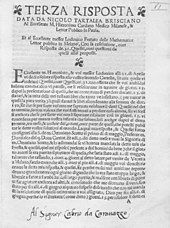Lodovico Ferrari
Lodovico de Ferrari | |
|---|---|
| Born | 2 February 1522 |
| Died | 5 October 1565 (aged 43) Bologna |
| Nationality | Italian |
| Known for | Solving the biquadratic equations |
| Scientific career | |
| Fields | Mathematics |
| Academic advisors | Gerolamo Cardano |

Lodovico de Ferrari (2 February 1522 – 5 October 1565) was an Italian mathematician best known today for solving the biquadratic equation.
Biography
[edit]Born in Bologna, Lodovico's grandfather, Bartolomeo Ferrari, was forced out of Milan to Bologna. Lodovico settled in Bologna, and he began his career as the servant of Gerolamo Cardano. He was extremely bright, so Cardano started teaching him mathematics. Ferrari aided Cardano on his solutions for biquadratic equations and cubic equations, and was mainly responsible for the solution of biquadratic equations that Cardano published. While still in his teens, Ferrari was able to obtain a prestigious teaching post in Rome after Cardano resigned from it and recommended him. Ferrari retired when young at 42 years old, and wealthy.[1]: 300 He then moved back to his home town of Bologna where he lived with his widowed sister Maddalena to take up a professorship of mathematics at the University of Bologna in 1565. Shortly thereafter, he died of white arsenic poisoning, according to a legend, by his sister.[2]: 18
Cardano–Tartaglia formula
[edit]In 1545 a famous dispute erupted between Ferrari and Cardano's contemporary Niccolò Fontana Tartaglia, involving the solution to cubic equations. Widespread stories that Tartaglia devoted the rest of his life to ruining Ferrari's teacher and erstwhile master Cardano, however, appear to be fabricated.[3] Mathematical historians now credit both Cardano and Tartaglia with the formula to solve cubic equations, referring to it as the "Cardano–Tartaglia formula".
References
[edit]- ^ Smith, D. E., History of Mathematics, Vol 1 (New York: Dover Publications, 1958), p. 300.
- ^ Gindikin, S., Tales of Mathematicians and Physicists (A. Shuchat, Trans.). Springer; 2007. ISBN 978-0-387-48811-0. p. 18.
- ^ Rothman, T., "Cardano v Tartaglia: The Great Feud Goes Supernatural".
Further reading
[edit]- Jayawardene, S. A. (1970–1980). "Ferrari, Lodovico". Dictionary of Scientific Biography. Vol. 4. New York: Charles Scribner's Sons. pp. 586–8. ISBN 978-0-684-10114-9.
External links
[edit] Media related to Lodovico Ferrari at Wikimedia Commons
Media related to Lodovico Ferrari at Wikimedia Commons- O'Connor, John J.; Robertson, Edmund F., "Lodovico Ferrari", MacTutor History of Mathematics Archive, University of St Andrews
